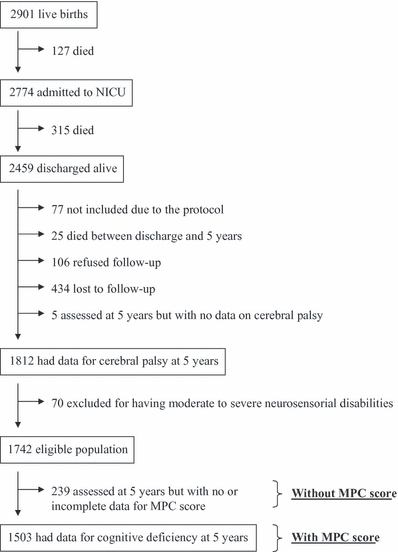Predictors of the risk of cognitive deficiency in very preterm infants: the EPIPAGE prospective cohort
- PMID: 21241364
- PMCID: PMC3080666
- DOI: 10.1111/j.1651-2227.2010.02064.x
Predictors of the risk of cognitive deficiency in very preterm infants: the EPIPAGE prospective cohort
Abstract
Aim: To assess cerebral lesions and other medical as well as social characteristics as predictors of risk of mild and severe cognitive deficiencies in very preterm infants.
Methods: As part of the EPIPAGE population-based prospective cohort study, perinatal data and cognitive outcome at 5 years of age were recorded for 1503 infants born before 33 weeks of gestation in nine regions of France in 1997. Mild cognitive deficiency was defined as a Mental Processing Composite score on the Kaufman Assessment Battery for Children test of between 70 and 84, and severe cognitive deficiency as a score of <70.
Results: After controlling for cerebral lesions and other medical as well as social factors, low parental socio-economic status and lack of breastfeeding were significant predictors of mild and severe cognitive deficiencies, whereas presence of cerebral lesions, being small for gestational age and having a large number of siblings were predictors of severe cognitive deficiency.
Conclusion: Predictors of poor cognitive outcome in very preterm infants are low social status, lack of breastfeeding, presence of cerebral lesions on ultrasound scan, being born small for gestational age and having a high number of siblings. Social factors predicted both mild and severe cognitive deficiencies, whereas medical factors predicted mostly severe cognitive deficiencies.
© 2011 The Author(s)/Acta Paediatrica © 2011 Foundation Acta Paediatrica.
Comment in
-
White matter damage and neonatal sepsis.Acta Paediatr. 2011 Jul;100(7):e1; author reply e1-2. doi: 10.1111/j.1651-2227.2011.02217.x. Epub 2011 Mar 11. Acta Paediatr. 2011. PMID: 21392100 No abstract available.
References
-
- Bhutta AT, Cleves MA, Casey PH, Cradock MM, Anand KJ. Cognitive and behavioral outcomes of school-aged children who were born preterm: a meta-analysis. JAMA. 2002;288:728–37. - PubMed
-
- Aylward GP. Cognitive and neuropsychological outcomes: more than IQ scores. Ment Retard Dev Disabil Res Rev. 2002;8:234–40. - PubMed
-
- Gross SJ, Mettelman BB, Dye TD, Slagle TA. Impact of family structure on academic outcome in preterm children at 10 years of age. J Pediatr. 2001;138:169–75. - PubMed
-
- Saigal S, Doyle LW. An overview of mortality and sequelae of preterm birth from infancy to adulthood. Lancet. 2008;371:261–9. - PubMed
Publication types
MeSH terms
LinkOut - more resources
Full Text Sources
Medical
Research Materials


